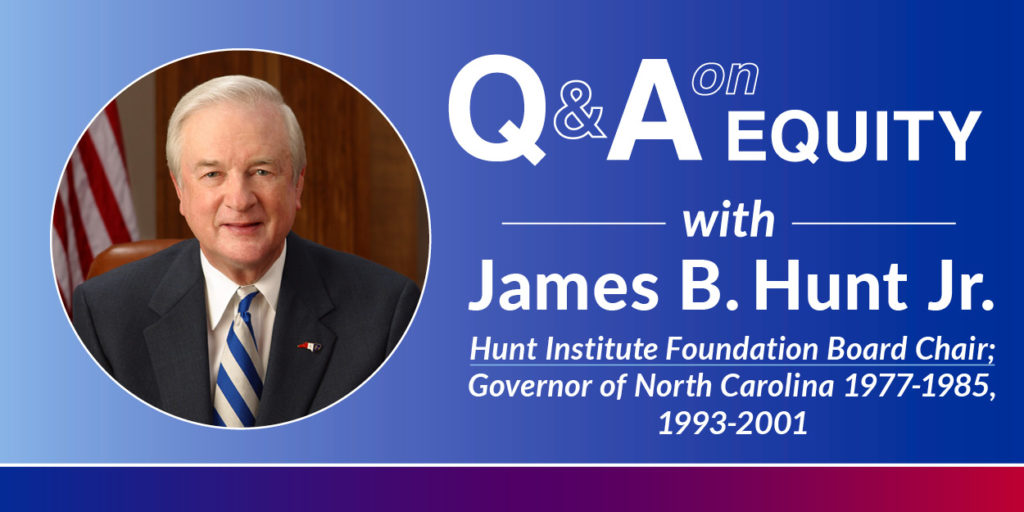

October 9, 2017

A: When I was governor, North Carolina became a leader in the state-level standards and assessment movement. This groundbreaking work, which was expanded nationally under No Child Left Behind, provided states with an accurate measure of student learning and progress in our schools. And as significant as that work was, the implementation of academic content standards and aligned assessments has illuminated a bigger and more pressing problem in our schools: the achievement gap.
Unfortunately, year after year, we see that minority and low-income students perform markedly lower on state assessments than their white and more advantaged peers. They also graduate from high school and attend college at lower rates than their peers. This achievement gap has a profound effect on our society by truly limiting the opportunities available to a wide cross-section of the young people in our country.
What’s worse is that these students routinely attend schools and systems that struggle to serve them well. They are disproportionately taught by inexperienced and under-qualified teachers, they attend schools that are funded at lower rates than their peers, and they regularly face unsafe conditions in their own public schools.
All students deserve the opportunity to succeed in life. We can only ensure that opportunity for our students when we strive towards creating an equitable system of education. We have a moral obligation to ensure that our most vulnerable students have an equal shot to graduate from high school well-prepared for college and the workforce. And that they have a real chance to develop the skills they need to earn a living wage and provide for their families.
For state leaders, this means building an education system that gives all students what they need to be successful. Equity demands that we finally embrace the notion that while the goals we have for our students should be equally high for all, the way we educate and support them may be vastly different. This may well mean that the schools serving our most underserved students may need additional resources to achieve equity.
A: The most important policy mechanism relating to ESSA is its ability to empower states to drive progress and improvement in education—but each state must have the determination to do this. Each of our states is different and unique, and I believe that teachers, education leaders, and policymakers will have the wisdom and gumption to seize this opportunity and responsibility.
Under ESSA, states once again have a critical opportunity and responsibility to develop assessment and accountability systems that will move our nation toward a more equitable future. And in pursuing that goal, it will be absolutely imperative that governors and education leaders provide adequate support and access to the students who need it most.
Equity in education is the most important thing we can offer the next generation. It will require bold leadership and vision at the state-level and I am confident, now more than ever, that our state leaders are poised to get it done.
A: Equity has always been and will continue to be a focus of our work at the Hunt Institute. It is a key component of all of our programs and drives us to meaningfully engage state policymakers in exploration and examination of key issues in education.
In particular, I am tremendously impressed by our growing network of Hunt-Kean Leadership Fellows. Over the past three years, we have been fortunate to work with over 70 key state leaders across the nation who are ready to make a difference for the students of their state. This next generation of governors and state leaders are prepared to drive truly remarkable education improvement in their states. I am hopeful that, under their leadership, we will see a wave of state education plans that lift up the least of us and achieve equity after all.